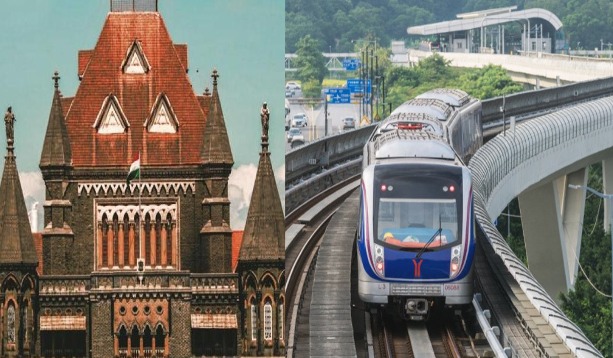
The Bombay High Court has recently dismissed a challenge to the alignment of Mumbai’s Metro Line 4 (ML-4)observing that the petitioners tried to stall and delay a project of public significance in the name of enforcing their private rights.
A division bench of acting Chief Justice SV Gangapurwala and Justice Sandeep V Marne said that the petitioners raised baseless arguments and made MMRDA to explain each action regarding metro project implementation unnecessarily.
“Not only are most of the petitioners’ arguments completely baseless, but they have unnecessarily made MMRDA and the State Government to justify every action relating to project execution, right from the legality of authority to MMRDA to implement the project. Rather than limiting their petitions to enforcing their private rights, petitioners have unnecessarily raised broader issues questioning respondents’ authority to carry out the ML-4 project. Under the guise of protecting and enforcing their private property rights, they have attempted to stall and delay a massive public undertaking.”
Metro Line 4 in Mumbai is a 32.32 km elevated metro corridor running from Wadala to Kasarvadawali with 30 stations connecting Mumbai and Thane.
In October 2016, the State Government accepted the alignment of ML4 and appointed MMRDA as the project implementation agency.
Indo Nippon holds 7332.50 square metres of land in Ghatkopar, Mumbai, and claims that the ML4 directly affects 27 percent of its plot. It claimed that the ML4 alignment would have an impact on its commercial activities and filed a writ petition to challenge the alignment.
The alignment was also challenged by the Yashwant organization, a three-building co-operative housing society. It alleged that MMRDA intentionally changed the alignment of ML4 at Goradia Nagar junction at the behest of one Mr. Goradia, who owns a bungalow opposite to the society.
The petitioners argued that MMRDA has no authority to implement ML4 because the Central Government has not appointed it as a General Manager under Section 3 of the Metro Act of 1978.
According to section 3, the Central Government “may” designate a General Manager for a metro project. As a result, the Centre is not required to designate a General Manager for each metro railway. The court observed that the petitioners did not challenge MMRDA’s authority when it was appointed as the executing agency in 2016, but only raised the objection in 2018 and 2019 after observing that their properties were impacted by ML4 alignment.
The petitioners claimed that the MMRDA did not follow the Metro Act’s land acquisition process.
The court ruled that a metro railway administration can choose between the Metro Act and any other Act allowing acquisition for the purpose of acquiring property.
The petitioners also alleged that the alignment of ML4 does not correspond to the alignment shown in the BMC’s Development Plan – 2034. Because the Development Plan has not been amended for each change in ML4, such a shift in alignment and subsequent reservation of land would violate Section 37 of MRTP Act, they argued.
The court ruled that the ML4 alignment is included in the Development Plan 2034, and the petitioners’ property is reserved. As a result, the court noted, the competent authority can acquire it under Section 126 of the MRTP Act.
The petitions claimed that the ML4 alignment is not finalised and is frequently changed based on MMRDA’s whims and fancies.
The court rejected this argument, noting that the ML4 has not only been finalised but is also part of the Development Plan 2034. The judge stated that it cannot be changed based on the whims and fancies of MMRDA because it cannot be changed unless approved by the state government.
Indo Nippon also claimed that MMRDA did not acquire the necessary permits to carry out the ML4 project. The court ruled that these issues could not be raised in a writ petition brought to enforce private property rights. However, the court noted that MMRDA had obtained numerous clearances, including those from the Forest Department, MCZMA, the State Environmental Impact Assessment Authority, tree cutting permission, and a fire NOC.
The court stated that Yashwant Society did not name Mr. Goradia or the MMRDA employees against whom it levelled allegations in its petition. Furthermore, the petitioner has provided no evidence to support its allegations, the court stated.
The court clarified that the petitioners are legally eligible to compensation for the acquisition of their properties. The court stated that the petitions deserve imposition of costs but refrained from doing so while dismissing the petitions.




